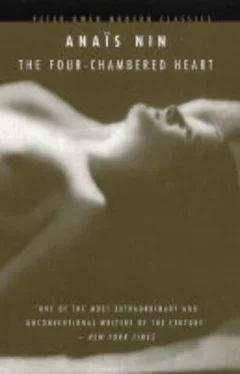Anaïs Nin - The Four-Chambered Heart
Здесь есть возможность читать онлайн «Anaïs Nin - The Four-Chambered Heart» весь текст электронной книги совершенно бесплатно (целиком полную версию без сокращений). В некоторых случаях можно слушать аудио, скачать через торрент в формате fb2 и присутствует краткое содержание. Год выпуска: 2004, ISBN: 2004, Издательство: Peter Owen Limited, Жанр: Классическая проза, Эротические любовные романы, на английском языке. Описание произведения, (предисловие) а так же отзывы посетителей доступны на портале библиотеки ЛибКат.
- Название:The Four-Chambered Heart
- Автор:
- Издательство:Peter Owen Limited
- Жанр:
- Год:2004
- ISBN:9780720611557
- Рейтинг книги:3 / 5. Голосов: 1
-
Избранное:Добавить в избранное
- Отзывы:
-
Ваша оценка:
- 60
- 1
- 2
- 3
- 4
- 5
The Four-Chambered Heart: краткое содержание, описание и аннотация
Предлагаем к чтению аннотацию, описание, краткое содержание или предисловие (зависит от того, что написал сам автор книги «The Four-Chambered Heart»). Если вы не нашли необходимую информацию о книге — напишите в комментариях, мы постараемся отыскать её.
The Four-Chambered Heart — читать онлайн бесплатно полную книгу (весь текст) целиком
Ниже представлен текст книги, разбитый по страницам. Система сохранения места последней прочитанной страницы, позволяет с удобством читать онлайн бесплатно книгу «The Four-Chambered Heart», без необходимости каждый раз заново искать на чём Вы остановились. Поставьте закладку, и сможете в любой момент перейти на страницу, на которой закончили чтение.
Интервал:
Закладка:
Anaïs Nin
THE FOUR-CHAMBERED HEART

THE GUITAR DISTILLED ITS MUSIC
Rango played it with the warm copper color of his skin, with the charcoal pupil of his eyes, with the underbrush thickness of his eyebrows, pouring into the honey-colored box the flavors of the open road on which he lived his gypsy life: thyme, rosemary, oregano, marjoram, and sage. Pouring into the resonant box the sensual swing of his hammock hung across the gypsy cart and the dreams born on his mattress of black horsehair.
Idol of the night clubs, where men and women barred doors and windows, lit candles, drank alcohol, and drank from his voice and his guitar the potions and herbs of the open road, the charivaris of freedom, the drugs of leisure and laziness.
At dawn, not content with the life transfusion through catguts, filled with the sap of his voice which had passed into their veins, at dawn the women wanted to lay hands upon his body. But at dawn Rango swung his guitar over his shoulder and walked away.
Will you be here tomorrow, Rango?
Tomorrow he might be playing and singing to his black horse’s philosophically swaying tail, on the road to the south of France.
Toward this ambulant Rango, Djuna leaned to catch all that his music contained, and her ear detected the presence of this unattainable island of joy which she pursued, which she had glimpsed at the party she had never attended but watched from her window as a girl. And like some lost voyager in a desert, she leaned more and more eagerly toward this musical mirage of a pleasure never known to her, the pleasure of freedom.
“Rango, would you play once for my dancing?” she asked softly and fervently, and Rango stopped on his way out to bow to her, a bow of consent which took centuries of stylization and nobility of bearing to create, a bow indicating the largesse of gesture of a man whad never been bound.
“Whenever you wish.”
As they planned for the day and hour, and while she gave him her address, they walked instinctively toward the river.
Their shadows walking before them revealed the contrast between them. His body occupied twice the space of hers. She walked unswerving like an arrow, while he ambled. His hands trembled while lighting her cigarette, and hers were steady.
“I’m not drunk,” he said, laughing, “but I’ve been drunk so often that my hands have remained unsteady for life, I guess.”
“Where is your cart and horse, Rango?”
“I have no cart and horse. Not for a long time. Not since Zora fell ill, years ago.”
“Zora?”
“My wife.”
“Is your wife a gypsy, too?”
“Neither my wife nor I. I was born in Guatemala, at the top of the highest mountain. Are you disappointed? That legend was necessary to keep up, for the night club, to earn a living. It protects me, too. I have a family in Guatemala who would be ashamed of my present life. I ran away from home when I was seventeen. I was brought up on a ranch. Even today my friends say: ‘Rango, where is your horse? You always look as if you had left your horse tied to the gate.’ I lived with the gypsies in the south of France. They taught me to play. They taught me to live as they do. The men don’t work; they play the guitar and sing. The women take care of them by stealing food and concealing it under their wide skirts. Zora never learned that! She got very ill. I had to give up roaming. We’re home now. Do you want to come in?”
Djuna looked at the gray stone house.
She had not yet effaced from her eyes the image of Rango on the open road. The contrast was painful and she took a step backward, suddenly intimidated by a Rango without his horse, without his freedom.
The windows of the house were long and narrow. They seemed barred. She could not bear yet to see how he had been captured, tamed, caged, by what circumstances, by whom.
She shook his big hand, the big warm hand of a captive, and left him so swiftly he was dazed. He stood bewildered and swaying, awkwardly lighting another cigarette, wondering what had made her take flight.
He did not know that she had just lost sight of an island of joy. The image of an island of joy evoked by his guitar had vanished. In walking toward a mirage of freedom, she had entered a black forest, the black forest of his eyes darkening when he said: “Zora is very ill.” The black forest of his wild hair as he bowed his head in contrition: “My family would be ashamed of the life I lead today.” The black forest of his bewilderment as he stood about to enter a house too gray, too shabby, too cramped for his big, powerful body.
Their first kiss was witnessed by the Seine River carrying gondolas of street lamps’ reflections in its spangled folds, carrying haloed street lamps flowering on bushes of black lacquered cobblestones, carrying silver filigree trees opened like fans beyond whose rim the river’s eyes provoked them to hidden coquetries, carrying the humid scarves of fog and the sharp incense of roasted chestnuts.
Everything fallen into the river and carried away except the balcony on which they stood.
Their kiss was accompanied by the street organ and it lasted the whole length of the musical score of Carmen, and when it ended it was too late; they had drunk the potion to its last drop.
The potion drunk by lovers is prepared by no one but themselves.
The potion is the sum of one’s whole existence.
Every word spoken in the past accumulated forms and colors in the self. What flows through the veins besides blood is the distillation of every act committed, the sediment of all the visions, wishes, dreams, and experiences. All the past emotions converge to tint the skin and flavor the lips, to regulate the pulse and produce crystals in the eyes.
The fascination exerted by one human being over another is not what he emits of his personality at the present instant of encounter but a summation of his entire being which gives off this powerful drug capturing the fancy and attachment.
No moment of charm without long roots in the past, no moment of charm is born on bare soil, a careless accident of beauty, but is the sum of great sorrows, growths, and efforts.
But love, the great narcotic, was the hothouse in which all the selves burst into their fullest bloom…
love the great narcotic was the revealer in the alchemist’s bottle rendering visible the most untraceable substances
love the great narcotic was the agent provocateur exposing all the secret selves to daylight
love the great narcotic-lined fingertips with clairvoyance
pumped iridescence into the lungs for transcendental x-rays
printed new geographies in the lining of the eyes
adorned words with sails, ears with velvet mutes
and soon the balcony tipped their shadows into the river, too, so that the kiss might be baptized in the holy waters of continuity.
Djuna walked along the Seine the next morning asking the fishermen and the barge sailors for a boat to rent in which she and Rango might live.
As she stood by the parapet wall, and then leaned over to watch the barges, a policeman watched her.
(Does he think I am going to commit suicide? Do I look like someone who would commit suicide? How blind he is! I never wanted less to die, on the very day I am beginning to live!)
He watched her as she ran down the stairs to talk to the owner of Nanette, a bright red barge. Nanette had little windows trimmed with beaded curtains just like the superintendent’s windows in apartment houses.
(Why bring to a barge the same trimmings as those of a house? They are not made for the river, these people, not for voyages. They like familiarity, they like to continue their life on earth, while Rango and I want to run away from houses, cafes, streets, people. We want to find an island, a solitary cell, where we can dream in peace together. Why should the policeman think I may jump into the river at this moment when I never felt less like dying? Or does he stand there to reproach me for slipping out of my father’s house last night after ten o’clock, with such infinite precautions, leaving the front door ajar so he would not hear me leave, deserting his house with a beating heart because now his hair is white and he no longer understands anyone’s need to love, for he has lost everything, not to love, but to his games of love; and when you love as a game, you lose everything, as he lost his home and wife, and now he clings to me, afraid of loss, afraid of solitude.)
Читать дальшеИнтервал:
Закладка:
Похожие книги на «The Four-Chambered Heart»
Представляем Вашему вниманию похожие книги на «The Four-Chambered Heart» списком для выбора. Мы отобрали схожую по названию и смыслу литературу в надежде предоставить читателям больше вариантов отыскать новые, интересные, ещё непрочитанные произведения.
Обсуждение, отзывы о книге «The Four-Chambered Heart» и просто собственные мнения читателей. Оставьте ваши комментарии, напишите, что Вы думаете о произведении, его смысле или главных героях. Укажите что конкретно понравилось, а что нет, и почему Вы так считаете.












